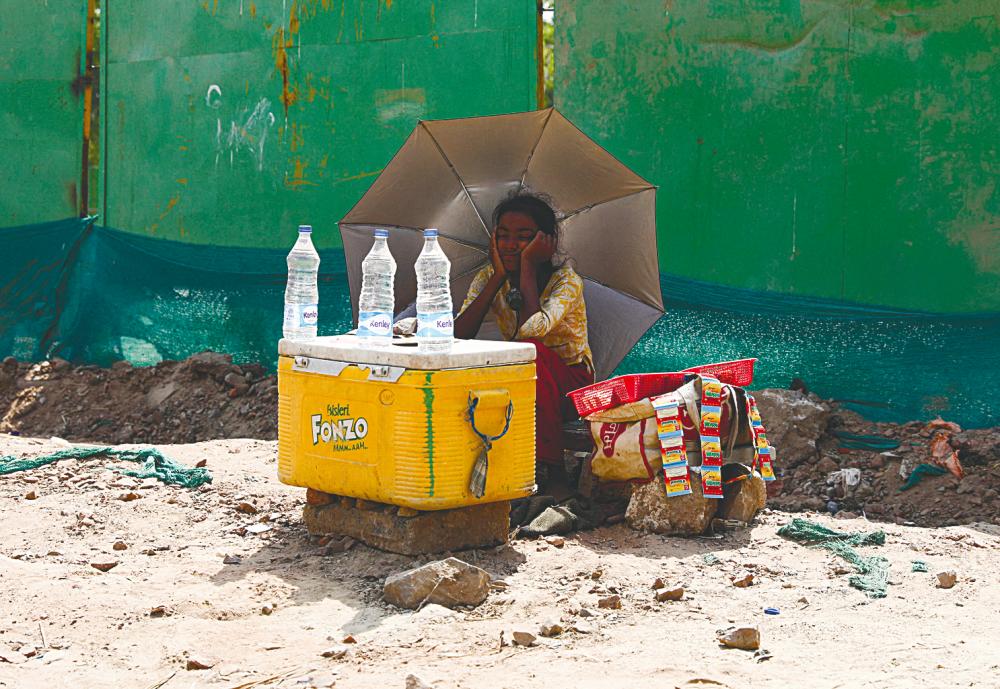THE title of this article may sound alarmist, yet it reflects the grim reality we are facing. Climate change is not a distant concern, it is a pressing issue that demands our attention.
The detrimental effects of climate change are already evident in our daily lives, both in Malaysia and across the globe. We are witnessing a world ablaze with environmental crises, yet many people remain apathetic.
Hardly a day goes by without news reports and analyses highlighting the devastating impact of catastrophic storms, heatwaves, droughts, floods, rising sea levels, disruptions to agriculture and food production, loss of biodiversity and the surge in tropical diseases as well as the associated health problems, including heart and mental health issues.
The images of the devastating aftermath caused by cyclones and tornadoes occurring around the world today are nothing short of shocking.
Furthermore, the unprecedented heatwave gripping our country serves as a deadly and cryptic warning of graver things to come.
Even the United Nations has issued a cautionary advice that the period from 2023 to 2027 is projected to be the hottest five-year span ever recorded. This is partly attributed to the El Nino effect, which in turn, is
also linked to the broader issue of climate change.
Beyond the environmental impact, climate change also poses a significant threat to global peace. True harmony and peaceful coexistence among humans and with our natural world – the very essence of world peace – is under siege.
Merely complaining about the problem will not yield solutions, it can only deepen disillusionment and despair among many individuals. Even if we have not been adversely affected yet, we cannot afford to be indifferent to its impacts.
As responsible citizens of this country and the world, we must take meaningful action.
To address the urgency of the situation, we begin by providing a clear and accessible explanation of what climate change entails.
Climate change, also known as global warming, is a process characterised by the gradual heating of the Earth’s atmosphere. It occurs due to the “greenhouse effect”, which is caused by the accumulation of greenhouse gases, primarily carbon dioxide (CO2), in the atmosphere. These gases form an invisible layer that acts as a barrier, trapping heat from the sun within the atmosphere.
It is important to note that CO2, despite being inert and non-toxic, contributes significantly to this phenomenon.
Climate change, arguably the most destructive form of environmental degradation, gained significant global attention during the United Nations Rio Earth Summit in 1992. This landmark event marked the first time in history that world leaders came together in Rio de Janeiro to address critical issues linked to the environment and development from a global perspective.
At the conference, the concept
of “Sustainable Development” was adopted from the influential Brundtland Report published in 1987. Sustainable development is defined as the responsible utilisation of resources to fulfil current needs without compromising the ability of future generations to meet their needs. It became a central pillar of the global environmental agenda.
Climate change is the result of unsustainable reliance on fossil fuels, such as coal, shale, oil and gas, since the start of the Industrial Revolution in the West in 1760. The rapid industrialisation, driven by aggressive capitalist forces, caused the release of massive amounts of carbon dioxide (CO2) into the atmosphere.
Furthermore, the increase in agricultural activities and farming has contributed to elevated methane emissions – particularly from livestock, such as cows – which is another greenhouse gas, thus exacerbating the situation.
The other form of air pollution is the local emission of toxic gases that are contaminating air quality, which can be deadly and have an immediate effect, such as the Bhopal Disaster in December 1984, which killed an estimated 8,000 people within
two weeks.
The rapid progression of global warming is primarily a result of the excessive accumulation of human-induced greenhouse gases in the atmosphere over a relatively short period since 1760, which is a mere
260 years in the context of the
Earth’s 4.5 billion-year history. This unprecedented increase is affecting the delicate balance of the ecosystem and, if left unchecked, can potentially cause the end of humanity.
The primary contributors to climate change are the oil and gas industry, which is responsible for the extraction and production of fossil fuels, and the transport and logistics industry, which heavily relies on unsustainable and non-renewable energy sources.
A critical question regarding sustainable development remains unanswered: if there are still significant reserves of coal, shale and oil and gas available on Earth, how can the over utilisation of these resources be deemed unsustainable for future generations?
The simple explanation is that over utilisation of finite, depleting and non-renewable resources (fossil fuels) can also cause climate change and have destructive consequences. This catastrophic result will undermine the ability of future generations to organise and meet their needs even if there are ample reserves of fossil fuels remaining.
Since the Rio Earth Summit, there has been more talk than action by the Western industrialised countries, which are the main polluters of greenhouse gases.
The industrialised West should bear a heavier responsibility to mitigate and address the problem, given their significant contribution to CO2 emissions, instead of placing the onus on poorer, developing countries to make sacrifices and curtail their progress.
The transition to renewable energy is not cheap and easy. It will require substantial capital investments in new technologies, which poorer nations may not be able to afford.
Despite various proposals from developed countries to support these nations in their renewable energy endeavours, proper implementation of these schemes has been lacking. There remains a significant gap between the discussions and actual actions taken by the industrialised West.
When it comes to climate change as a global phenomenon that transcends borders, we cannot adopt a self-centred, “not in my backyard” mindset that is often prevalent when dealing with pollution of air, water and toxic waste.
The writers are from a think tank unit under the Ipech Museum Group, Kuala Lumpur.
Comments: letters@thesundaily.com













